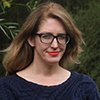Johanna Leggatt

Johanna Leggatt is a Melbourne-based writer and journalist. She has a master of arts from the University of Queensland and was a former online health editor on London’s The Daily Telegraph and sub-editor on The Guardian. She has also previously reported on court cases for Australian Associated Press (AAP) and was a news and features journalist on The Sun-Herald in Sydney.
The Covid-19 pandemic has left its mark on all of us. How could it not? The shuttered small businesses; the warring states; the spectre of aged care residents, hands pressed against glass, unable to touch or receive relatives. The Centrelink queues, the taped-up playgrounds, the closed borders. The stranded cruise ships, the panic buying of toilet paper, the unrelenting and crushing boredom of o ... (read more)
When journalist Kate Legge’s husband of twenty-five years – former Fairfax CEO Greg Hywood – cheated on her with one of her girlfriends, she was discouraged from taking revenge in her most natural of forums: the printed word. Legge, who at the time worked as a features writer at The Australian newspaper, was lucky enough to have a wise adviser and fellow wordsmith discourage her from an impe ... (read more)
Journalist, editor, and publisher, Michael Cannon rose to prominence in print during its golden age of boundless advertising dollars, when those ‘rivers of gold’ paid for high salaries, fully staffed beats, and morning and evening newspaper editions. This was not a world of shrinking pages and newsroom cuts, of ‘digital-first’ mantras, click bait and Murdoch domination – not yet. But new ... (read more)
Is there a profession on Earth more mythologised than journalism? It’s hard to think of one. All that talk about the principles of the Fourth Estate, of keeping the powerful in check and guarding the public interest. In the days of well-funded journalism, university graduates were ushered into weekly shorthand training and could not advance further until their hand flew across the page at an unl ... (read more)
In early August, deep in the winter of Melbourne’s stage-four discontent, journalist Rachel Baxendale became the story. The Victorian political reporter for The Australian newspaper was attacked online for questioning Premier Daniel Andrews on his government’s hotel quarantine program, as an explosion of new coronavirus infections caused unprecedented economic shutdown and the curtailment of c ... (read more)
Listen to this essay read by the author.
During my first month as a trainee journalist at The Sun-Herald newspaper in Sydney, I went on strike. It was the year 2000, and the newspaper enjoyed a full roster of reporters and photographers dedicated solely to one edition each Sunday, yet even during this well-resourced period there were inklings of the headwinds to come.
The Fairfax (now Nine Ent ... (read more)
Modern US culture has a peculiar love of the extracurricular world of teenagers, valorising the spelling bees, debating competitions, and varsity-level football games of its youth. In Ben Lerner’s new novel, The Topeka School, the interscholastic debating trophy is so sought after that tournaments resemble verbal combat, in which high-school competitors rely on sly technique rather than substanc ... (read more)
Two years before Rachel Cusk published the first novel in her acclaimed Outline Trilogy (2014–18), she wrote a searing account of her divorce, entitled ‘Aftermath: On Marriage and Separation’, which ignited a brouhaha in her homeland, the United Kingdom. The dramatic excoriation of marital life aroused apoplexy among critics and readers; they bristled at Cusk’s subjective and one-sided sto ... (read more)
There is a scene in Kenneth Branagh’s British film, All is True, where the earl of Southampton (Ian McKellen) tells William Shakespeare (Branagh) that The Bard has lived ‘a small life’. As the Southampton points out snidely, there have been no scandals in Shakespeare’s backstory, no drunken gallivanting on the Continent or tempers flaring in taverns over misconstrued sonnets. Yet, as uncon ... (read more)




